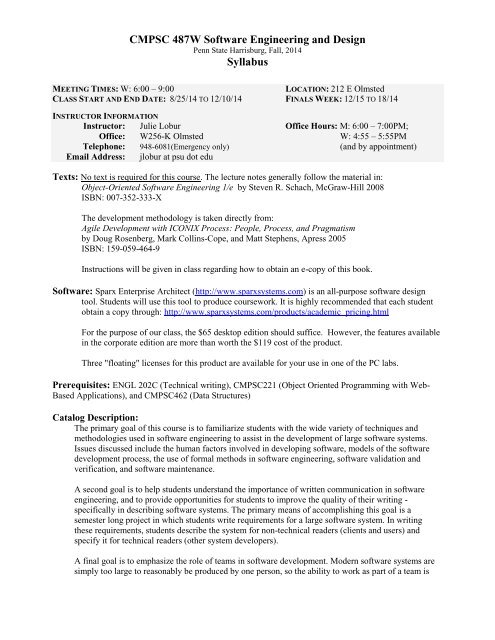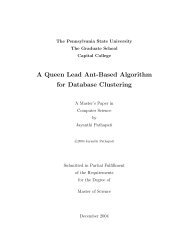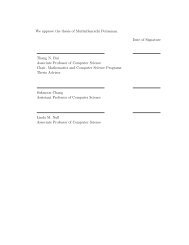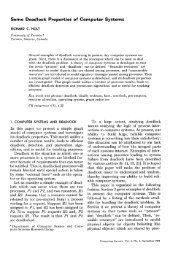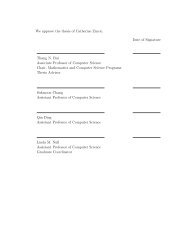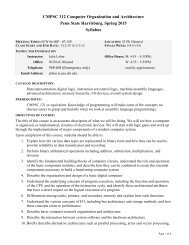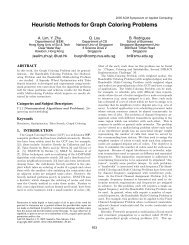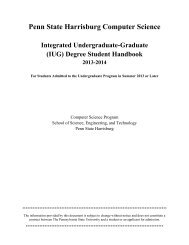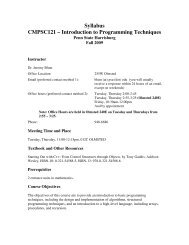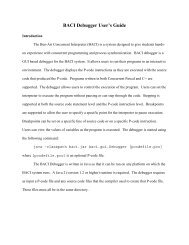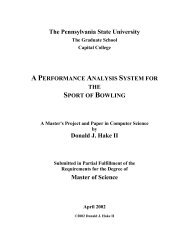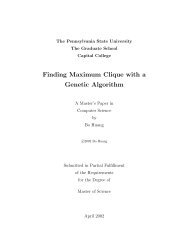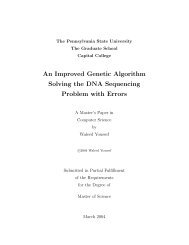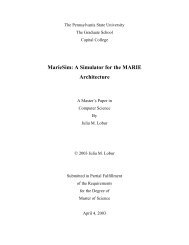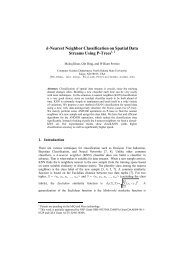Course Syllabus - Penn State Harrisburg Math/Computer Sciences ...
Course Syllabus - Penn State Harrisburg Math/Computer Sciences ...
Course Syllabus - Penn State Harrisburg Math/Computer Sciences ...
You also want an ePaper? Increase the reach of your titles
YUMPU automatically turns print PDFs into web optimized ePapers that Google loves.
CMPSC 487W Software Engineering and Design<strong>Penn</strong> <strong>State</strong> <strong>Harrisburg</strong>, Fall, 2014<strong>Syllabus</strong>MEETING TIMES: W: 6:00 – 9:00LOCATION: 212 E OlmstedCLASS START AND END DATE: 8/25/14 TO 12/10/14 FINALS WEEK: 12/15 TO 18/14INSTRUCTOR INFORMATIONInstructor: Julie Lobur Office Hours: M: 6:00 – 7:00PM;Office: W256-K Olmsted W: 4:55 – 5:55PMTelephone: 948-6081(Emergency only) (and by appointment)Email Address: jlobur at psu dot eduTexts: No text is required for this course. The lecture notes generally follow the material in:Object-Oriented Software Engineering 1/e by Steven R. Schach, McGraw-Hill 2008ISBN: 007-352-333-XThe development methodology is taken directly from:Agile Development with ICONIX Process: People, Process, and Pragmatismby Doug Rosenberg, Mark Collins-Cope, and Matt Stephens, Apress 2005ISBN: 159-059-464-9Instructions will be given in class regarding how to obtain an e-copy of this book.Software: Sparx Enterprise Architect (http://www.sparxsystems.com) is an all-purpose software designtool. Students will use this tool to produce coursework. It is highly recommended that each studentobtain a copy through: http://www.sparxsystems.com/products/academic_pricing.htmlFor the purpose of our class, the $65 desktop edition should suffice. However, the features availablein the corporate edition are more than worth the $119 cost of the product.Three "floating" licenses for this product are available for your use in one of the PC labs.Prerequisites: ENGL 202C (Technical writing), CMPSC221 (Object Oriented Programming with Web-Based Applications), and CMPSC462 (Data Structures)Catalog Description:The primary goal of this course is to familiarize students with the wide variety of techniques andmethodologies used in software engineering to assist in the development of large software systems.Issues discussed include the human factors involved in developing software, models of the softwaredevelopment process, the use of formal methods in software engineering, software validation andverification, and software maintenance.A second goal is to help students understand the importance of written communication in softwareengineering, and to provide opportunities for students to improve the quality of their writing -specifically in describing software systems. The primary means of accomplishing this goal is asemester long project in which students write requirements for a large software system. In writingthese requirements, students describe the system for non-technical readers (clients and users) andspecify it for technical readers (other system developers).A final goal is to emphasize the role of teams in software development. Modern software systems aresimply too large to reasonably be produced by one person, so the ability to work as part of a team is
vital. To support achieving this goal, techniques and tools for working in groups are discussed in thecourse, and students work on the semester project in teams.An effective software engineer possesses a wide range of technical skills, to include proficiency in moderndevelopment techniques and programming languages. In addition to these, an excellent software engineerpossesses "soft skills" such as a demonstrated ability to communicate clearly orally and in writing, and—most importantly—a demonstrated ability to work effectively as a member of a team. CMPSC 487W hasbeen designed to allow you the opportunity to develop these skills through reading and written assignments.It is essential for you to participate actively in all assignments so that you get the greatest benefit from thisclass.Topics to be Covered*SchachChapter(s)Session 1: August 27 The Scope of Software Engineering1Introduction to UMLSession 2: September 3 Software Life-Cycle Models:2, 3 Waterfall Agile Unified ProcessSeptember 3: Regular Drop deadlineSession 3: September 10 The Requirements Workflow I10Elicitation, Articulation, and Validation:Determining what the system needs to do.Session 4: September 17 The Requirements Workflow II: From11requirements to early design (RobustnessAnalysis)Session 5: September 24 The Design Workflow12, 7From Modules to ObjectsSession 6: October 1 Patterns for design and analysisSession 7: October 8 Midterm ExamSession 8: October 15 Reusability and PortabilityMaintenance814Session 9: October 22 Planning and Estimating 9Session 10: October 29 EthicsSession 11: November 5 Project Management Part ISession 12: November 12 Project Management Part IINovember 14: Late Drop deadlineSession 13: November 19 Testing and Software QA 6November 26Session 14: December 3No classTools of the TradeSoftware ArchitecturesSession 15: December 10 Teams and the Human Element 4December 12: Withdrawal deadlineDecember 17 Final exam (Tentative)* Dates are approximate.5 - Tools(No chapterforarchitecture)The instructor reserves the right to modify this list. Students will be notified should this become necessary.
Required Work and GradesStudents are expected to attend all lectures and to do all reading assignments. In addition, there will be asemester project, and two exams (a midterm and a final). Point distribution is approximately as follows:Homework and Projects 40% 200Exams 50% 250Class participation 10% 50Your instructor reserves the right to assign homework or administer unannounced quizzes at any time duringthe semester. Such additional work will cause the total number of points for the semester to increase, thusmaking the percentages shown above to become proportionately smaller.Readings from many different sources will be assigned and students will be expected to discuss the readingsin class.The following table gives the percentage of the total points needed to guarantee the associated final grade inthe course.A- 90 - 100% D 60 - 69%B- 80 - 89% F below 60%C 70 - 79%+/- grades will be assigned at the discretion of the instructor. Instructor reserves the right to arbitrateborderline cases.CLASS POLICIESAssignments: Due dates for all assignments will be announced in class. An assignment is due at thebeginning of the class on the specified due date. Assignments handed in after the beginning of class butbefore the beginning of the next class will receive half credit. Assignments received thereafter will receive nocredit.Exams: STUDENTS ARE EXPECTED TO TAKE EXAMS AT THE SCHEDULED TIMES. Exam timeswill be announced in class. If you must miss a exam it is your responsibility to notify the instructor at least24 hours PRIOR to the exam, either by e-mail or in person. The instructor will respond to e-mail as quicklyas possible. Failure to follow these instructions will result in a grade of zero on the exam. Make-up work willbe given ONLY for valid and verifiable reasons. Valid reasons include illness, family emergencies, andschool-sponsored trips. You must provide written documentation for illnesses, emergencies, and trips.E-Mail: At times it is necessary to make announcements through e-mail. It is the responsibility of thestudent to regularly check his/her e-mail. If you do not have an Access e-mail account, go tocs.hbg.psu.edu/misc/index.html to see how you can apply for one.E-mail messages to the instructor's account are welcome when appropriate. Please put your name andCMPSC487 under the SUBJECT header when you send e-mail. Failure to follow this format may result inyour e-mail being ignored!<strong>Course</strong> Web Page: All important announcements made through e-mail will also be posted on the courseWeb page at: http://cs.hbg.psu.edu/cmpsc487. It is the responsibility of the student to regularly check theWeb page. Failure to receive a course e-mail, and failure to regularly check the course Web page does notrelieve the student of the responsibility for information posted there.Class Conduct: Conduct in class that adversely affects the ability of other students to learn will adverselyaffect your grade. I expect all students to be courteous to others during class. This includes arriving on time,
efraining from unnecessary talking or reading newspapers, not interrupting others, raising your hand tospeak, and turning off cell phones and pagers (or putting them on vibrate). Notebook computers are allowedfor note taking, but should not be used for game playing or other pursuits not related to class. Also, studentsare expected to finish their meals, and partake of all snacks prior to entering the classroom. Any otherdistracting or disruptive behavior is also strictly prohibited.For information regarding Academic Calendar, Academic Integrity, Americans with Disabilities Act,Learning Center Information, and Weather Cancellation Policy go to:cs.hbg.psu.edu/additional-syllabus-info/


